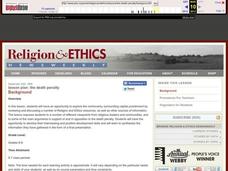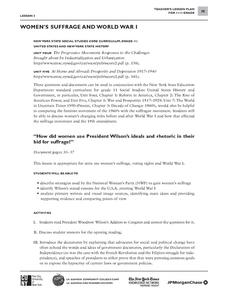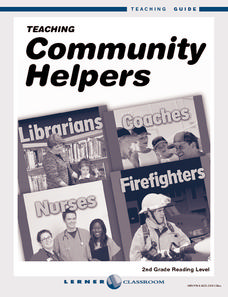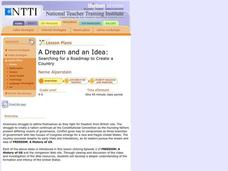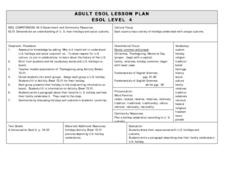Curated OER
The Death Penalty
Students examine the controversy surrounding the death penalty in the United States. In this current events lesson, students research the history of the death penalty as well perspectives on the topic. Students interview others about the...
Curated OER
Baby Boom and the Culture of the 1950's
Students study the ripple effect of the baby boom generation on history and on their lives today. They discover how the rules and conformity of the 1950's set the stage for the rebellious, anti-establishment sixties. They study the...
Curated OER
A More Perfect Union: Women's Suffrage and the Constitution
Young scholars reflect on the pros and cons of Women's Suffrage and it was viewed during the late 1800's. For this history lesson, students will analyze documents on women's suffrage so that they can compare and contrast the rights...
Ohio Center For Law-Related Education
Four Activities: Thurgood Marshall and the Nomination and Confirmation of Federal Judges
The process of nominating and confirming federal judges can sound like a lot of bureaucratic hoops, but a resource breaks down the steps of the Supreme Court nominations in a simpler manner. Learners participate in four activities that...
Anti-Defamation League
Soccer, Salaries and Sexism
Call it soccer, call it football, but call it unfair! the US women's soccer team has called out the US Soccer Federation for unfair treatment in terms of salaries, support, and working conditions in a lawsuit filed in 2019. Young...
National Endowment for the Humanities
The Preamble to the Constitution: A Close Reading Lesson
"We the people of the United States, in order to form a more perfect union..." These familiar lines begin the Preamble to the Constitution, but do learners know what they mean? A close reading exercise takes a look at the language of the...
Curated OER
Japanese-American Relocation
Consider the causes and effects that led to the internment and relocation of Japanese Americans during WWII. Learners read the story "Baseball Saved Us" and selected chapters from Farewell to Manzanar. Then, they view a slide-show, and...
City University of New York
Woman's Suffrage and World War I
How did women use President Wilson's ideals and rhetoric in their bid for suffrage? To answer this essential question, class groups analyze primary written documents and visual images.
Lerner Publishing
Teaching Community Helpers
Youngsters discover who the leaders in their community are and what it means to build a community in this four-lesson unit.
Judicial Learning Center
Civil Rights and Equal Protection
Almost every American is familiar with the Supreme Court case of Brown vs. Board of Education. Far fewer understand the constitutional reasoning or the wide-ranging consequences of the ruling in the field of criminology. The interesting...
Judicial Learning Center
Your 1st Amendment Rights
Why should classes care about the First Amendment? An engaging lesson serves as a powerful tool for answering just that. As all four cases in the lesson relate directly to freedom of expression in schools, young scholars explore the...
Judicial Learning Center
The Judge and the Jury
Unless you are a lawyer, you might not understand just how unrealistic Law and Order and other legal dramas actually are. Here's a great resource to help scholars of criminology gain a more realistic perspective. The lesson outlines the...
National Endowment for the Humanities
Lesson 2: The United States, France, and the Problem of Neutrality, 1796–1801
While the French Revolution could be considered inspired by the American Revolution, it created thorny problems for the new United States. Should the United States get involved and be drawn into a European drama? Was the US strong...
New York City Department of Education
Geography and Early Peoples of the Western Hemisphere
Young historians discover the early people of the western hemisphere. The unit explores how the land changed, how it was used and homes of early Americans such as Incas, Mayans, Inuits, Aztecs, and Pueblos. Individuals also examine these...
Smithsonian Institution
Spanish American War
Today, Cuba and America sometimes struggle with diplomatic relations, but did you know that America went to war against Spain to free Cuba? Learners examine many interesting facts related to the Spanish American War using an informative...
Annenberg Foundation
Migrant Struggle
The American Dream is a goal that many pursue, but is it truly attainable for all people? An in-depth lesson explores the plight of migrants in twentieth-century America. The resource includes a video and author biographies and...
Amnesty International
Hotel Rwanda Teacher's Guide
Here is the comprehensive, official educator's guide for presenting Hotel Rwanda and the story of the Rwandan genocide in 1994 to a classroom environment. It includes a range of exceptional hands-on or discussion activities, as well...
Curated OER
Historical Moments
Here is a instructional activity designed to be an ongoing task for the entire year. Each day of the week, learners must perform research to answer a simple historical question. This particular instructional activity covers the month of...
Curated OER
History in the Making
Students create and perform a skit that demonstrates the historical period and foriegn policy of a particular president. They first complete a diagram of George Washington's presidency as a class and then form small groups to research...
Curated OER
Contemporary History: Watergate
Students explore the Watergate scandal. In this Watergate lesson plan, students watch a video regarding the scandal and use the Internet to research it as well. Students then interview adults who share memories of the scandal.
Curated OER
A Dream and an Idea: Searching for a Roadmap to Create a Country
Pupils compare and contrast opposing visions of government held by the founding fathers. They evaluate the roles of historical leaders in shaping the U.S. as an emerging nation.
Curated OER
WWII and the Atomic Bomb
Learners explore three decisions about the atomic bomb faced by the U.S. during WWII, take a position on each of the decisions, and defend their position. Should a bomb have been built, dropped, and was the right decision made?
Curated OER
United States Holidays and Customs
Students identify and describe the importance of U.S. holidays and social customs. In groups, Students write a detailed description of a U.S. holiday and how it is celebrated. Descriptions are presented to the class. This lesson is...
Curated OER
Inaugurating a President
Learners study the traditions and history of the U.S. Presidential Inaugurations. They examine the topics George W. Bush talked about in his inaugural address and determine if his remarks clearly outlined what he has done.


